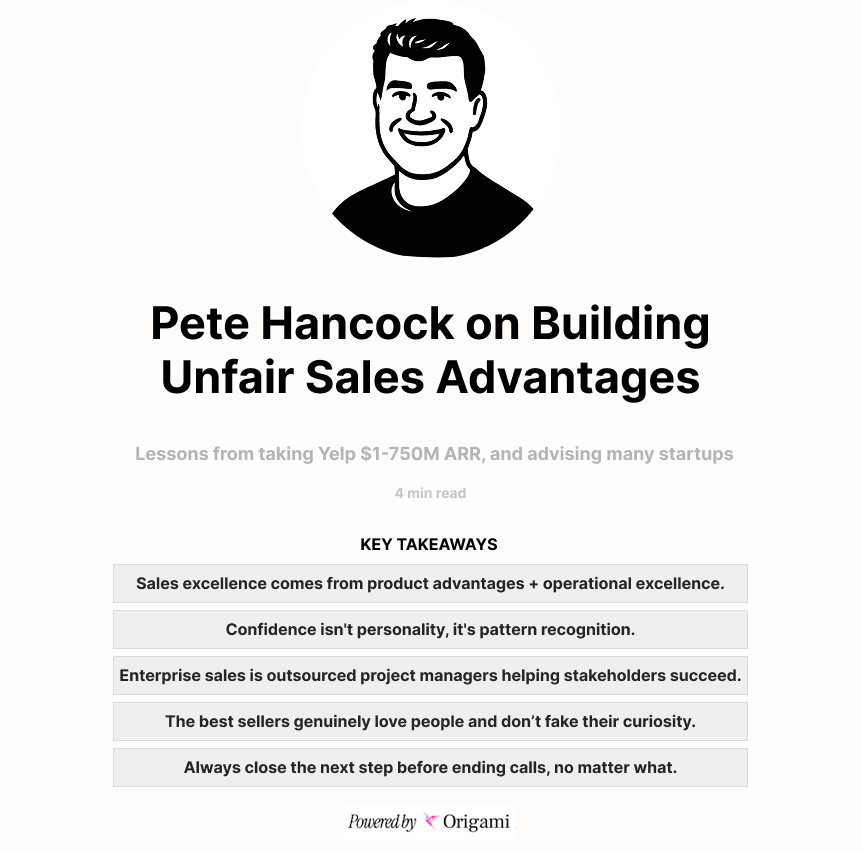
Pete Hancock is a sales vet and GTM advisor to Seed-Series B companies.
Previously, he was the SVP of Global Sales at Restream and VP of National Sales at Yelp (helped scale from $1M to $750M!)
He sat down with Luke from Origami to discuss what separates good sales teams from great ones in today's rapidly evolving landscape.
On why the best sales team can still lose
The biggest misconception in sales is that tactics alone can drive breakout success. You can have the best sales team, the best training, the best messaging, and the best tools, but ultimately you need something structural about your product or market opportunity that creates an unfair competitive advantage.
At Yelp, we had the largest freemium model for SMBs in the world. Every single small business was on the platform whether they wanted to be or not. This gave us two massive advantages: a huge TAM to feed our funnel, and built-in credibility when we called because prospects were already engaging with the product.
That structural advantage enabled us to make the economics work on what was otherwise a brutal motion - 80 cold calls per day to auto repair shops and restaurants, setting 2 appointments daily, closing 4 to 5 deals per month at $4,000 ACV. Without that freemium foundation, those numbers would never have worked.
You really need both: the structural advantage + operational excellence layered on top.
On how to systematize what great reps feel in their bones
Excellence in sales fundamentally comes down to confidence, but confidence isn't just about personality - you can actually operationalize it through systems and data.
At Yelp, I'd start every day walking around our sales pod asking reps what they were working on. I was running an algorithm in my brain, looking for signals that indicated which deals were most likely to close. Maybe it was a review mentioning the owner's name, or ten phone calls generated from Yelp yesterday that the business owner didn't even know about.
The key is taking that pattern recognition from experienced managers / reps and systematizing it. When you can feed AI those same signals and insights, you're essentially operationalizing the confidence that comes from experience.
The technology isn't thinking "maybe I should go back to bartending" - it's trained to spot opportunities and provide the context that makes reps more effective.
On why great sellers want to know where you're from
The best enterprise salespeople are genuinely curious about people and their businesses. They're not just using curiosity as a tactic to close deals. They actually love talking to that Uber driver and learning about where people are from.
I always say I want to hire the person who loves talking to the Uber driver so much that by the end of the ride, the driver is trying to set them up with his son/daughter. You can't fake that level of genuine human connection. There's no reason you have to talk to the Uber driver, but if you genuinely enjoy people, you're genuinely curious about them, then you do it naturally.
This genuine interest leads to everything else: better preparation, more thoughtful follow-ups, stronger relationships.
On enterprise sales being project management
An enterprise salesperson is essentially an outsourced project manager for the company that's looking to buy something.
When we were onboarding NASA to use Restream for livestreaming (we're talking millions of viewers, kids in small villages watching astronauts) there had to be a human element.
They're not just evaluating your product. They're feeling you out throughout this entire process because when they start working with you, they don't want to do this again in a year. At minimum, they're going to want to stick with you for three years.
You're not just delivering results for NASA. You're delivering for the four stakeholders who are thinking about their careers, reputations, and year-end goals.
So if it's a salesperson who loves NASA, believes in what they're doing, is excited about having them as a customer, and has all the tech in the world to augment their work, that person + technology is going to beat just technology every single day.
On the 5 minutes that separate good reps from great ones
Always close the next step before ending every call. Everyone knows this, but it's surprisingly difficult to execute consistently.
You need to leave yourself five minutes at the end of every single call. There needs to be alarm bells going off when you've only got five minutes left. No matter what's happening, you have to pivot to how you're going to get to the next step if you haven't already defined it.
What does that mean? When's the next call? Why does the next call matter? What are we going to cover? What does this whole process look like, and where are we within that process? You're not putting any work on them - you're making it completely clear and frictionless.
Even in high velocity sales, it's the same thing. We used to say, "Are you ready to move forward? Yes? This is going to take five minutes. Here's what we're going to do."
Taking that moment to pause and walk them through the closing process instead of just doing it builds the trust and certainty that makes everything else work.
That’s it for this week!
Thanks for wanting to know more today than you did yesterday! If you liked this edition, forward it to your a friend who would like it too 🤝
Find more Modern GTM interviews here.
Learn how Origami helps sales teams here.
‘Til next time!
